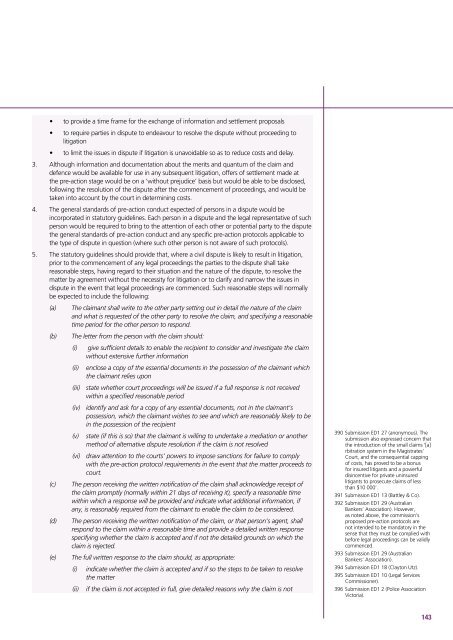Facilitating the Early Resolution of Disputes without Litigation
Facilitating the Early Resolution of Disputes without Litigation
Facilitating the Early Resolution of Disputes without Litigation
Create successful ePaper yourself
Turn your PDF publications into a flip-book with our unique Google optimized e-Paper software.
• to provide a time frame for <strong>the</strong> exchange <strong>of</strong> information and settlement proposals• to require parties in dispute to endeavour to resolve <strong>the</strong> dispute <strong>without</strong> proceeding tolitigation• to limit <strong>the</strong> issues in dispute if litigation is unavoidable so as to reduce costs and delay.3. Although information and documentation about <strong>the</strong> merits and quantum <strong>of</strong> <strong>the</strong> claim anddefence would be available for use in any subsequent litigation, <strong>of</strong>fers <strong>of</strong> settlement made at<strong>the</strong> pre-action stage would be on a ‘<strong>without</strong> prejudice’ basis but would be able to be disclosed,following <strong>the</strong> resolution <strong>of</strong> <strong>the</strong> dispute after <strong>the</strong> commencement <strong>of</strong> proceedings, and would betaken into account by <strong>the</strong> court in determining costs.4. The general standards <strong>of</strong> pre-action conduct expected <strong>of</strong> persons in a dispute would beincorporated in statutory guidelines. Each person in a dispute and <strong>the</strong> legal representative <strong>of</strong> suchperson would be required to bring to <strong>the</strong> attention <strong>of</strong> each o<strong>the</strong>r or potential party to <strong>the</strong> dispute<strong>the</strong> general standards <strong>of</strong> pre-action conduct and any specific pre-action protocols applicable to<strong>the</strong> type <strong>of</strong> dispute in question (where such o<strong>the</strong>r person is not aware <strong>of</strong> such protocols).5. The statutory guidelines should provide that, where a civil dispute is likely to result in litigation,prior to <strong>the</strong> commencement <strong>of</strong> any legal proceedings <strong>the</strong> parties to <strong>the</strong> dispute shall takereasonable steps, having regard to <strong>the</strong>ir situation and <strong>the</strong> nature <strong>of</strong> <strong>the</strong> dispute, to resolve <strong>the</strong>matter by agreement <strong>without</strong> <strong>the</strong> necessity for litigation or to clarify and narrow <strong>the</strong> issues indispute in <strong>the</strong> event that legal proceedings are commenced. Such reasonable steps will normallybe expected to include <strong>the</strong> following:(a)(b)(c)(d)(e)The claimant shall write to <strong>the</strong> o<strong>the</strong>r party setting out in detail <strong>the</strong> nature <strong>of</strong> <strong>the</strong> claimand what is requested <strong>of</strong> <strong>the</strong> o<strong>the</strong>r party to resolve <strong>the</strong> claim, and specifying a reasonabletime period for <strong>the</strong> o<strong>the</strong>r person to respond.The letter from <strong>the</strong> person with <strong>the</strong> claim should:(i)(ii)give sufficient details to enable <strong>the</strong> recipient to consider and investigate <strong>the</strong> claim<strong>without</strong> extensive fur<strong>the</strong>r informationenclose a copy <strong>of</strong> <strong>the</strong> essential documents in <strong>the</strong> possession <strong>of</strong> <strong>the</strong> claimant which<strong>the</strong> claimant relies upon(iii) state whe<strong>the</strong>r court proceedings will be issued if a full response is not receivedwithin a specified reasonable period(iv) identify and ask for a copy <strong>of</strong> any essential documents, not in <strong>the</strong> claimant’spossession, which <strong>the</strong> claimant wishes to see and which are reasonably likely to bein <strong>the</strong> possession <strong>of</strong> <strong>the</strong> recipient(v)state (if this is so) that <strong>the</strong> claimant is willing to undertake a mediation or ano<strong>the</strong>rmethod <strong>of</strong> alternative dispute resolution if <strong>the</strong> claim is not resolved(vi) draw attention to <strong>the</strong> courts’ powers to impose sanctions for failure to complywith <strong>the</strong> pre-action protocol requirements in <strong>the</strong> event that <strong>the</strong> matter proceeds tocourt.The person receiving <strong>the</strong> written notification <strong>of</strong> <strong>the</strong> claim shall acknowledge receipt <strong>of</strong><strong>the</strong> claim promptly (normally within 21 days <strong>of</strong> receiving it), specify a reasonable timewithin which a response will be provided and indicate what additional information, ifany, is reasonably required from <strong>the</strong> claimant to enable <strong>the</strong> claim to be considered.The person receiving <strong>the</strong> written notification <strong>of</strong> <strong>the</strong> claim, or that person’s agent, shallrespond to <strong>the</strong> claim within a reasonable time and provide a detailed written responsespecifying whe<strong>the</strong>r <strong>the</strong> claim is accepted and if not <strong>the</strong> detailed grounds on which <strong>the</strong>claim is rejected.The full written response to <strong>the</strong> claim should, as appropriate:(i)(ii)indicate whe<strong>the</strong>r <strong>the</strong> claim is accepted and if so <strong>the</strong> steps to be taken to resolve<strong>the</strong> matterif <strong>the</strong> claim is not accepted in full, give detailed reasons why <strong>the</strong> claim is not390 Submission ED1 27 (anonymous). Thesubmission also expressed concern that<strong>the</strong> introduction <strong>of</strong> <strong>the</strong> small claims ‘[a]rbitration system in <strong>the</strong> Magistrates’Court, and <strong>the</strong> consequential capping<strong>of</strong> costs, has proved to be a bonusfor insured litigants and a powerfuldisincentive for private uninsuredlitigants to prosecute claims <strong>of</strong> lessthan $10 000’.391 Submission ED1 13 (Battley & Co).392 Submission ED1 29 (AustralianBankers’ Association). However,as noted above, <strong>the</strong> commission’sproposed pre-action protocols arenot intended to be mandatory in <strong>the</strong>sense that <strong>the</strong>y must be complied withbefore legal proceedings can be validlycommenced.393 Submission ED1 29 (AustralianBankers’ Association).394 Submission ED1 18 (Clayton Utz).395 Submission ED1 10 (Legal ServicesCommissioner).396 Submission ED1 2 (Police AssociationVictoria).143
















